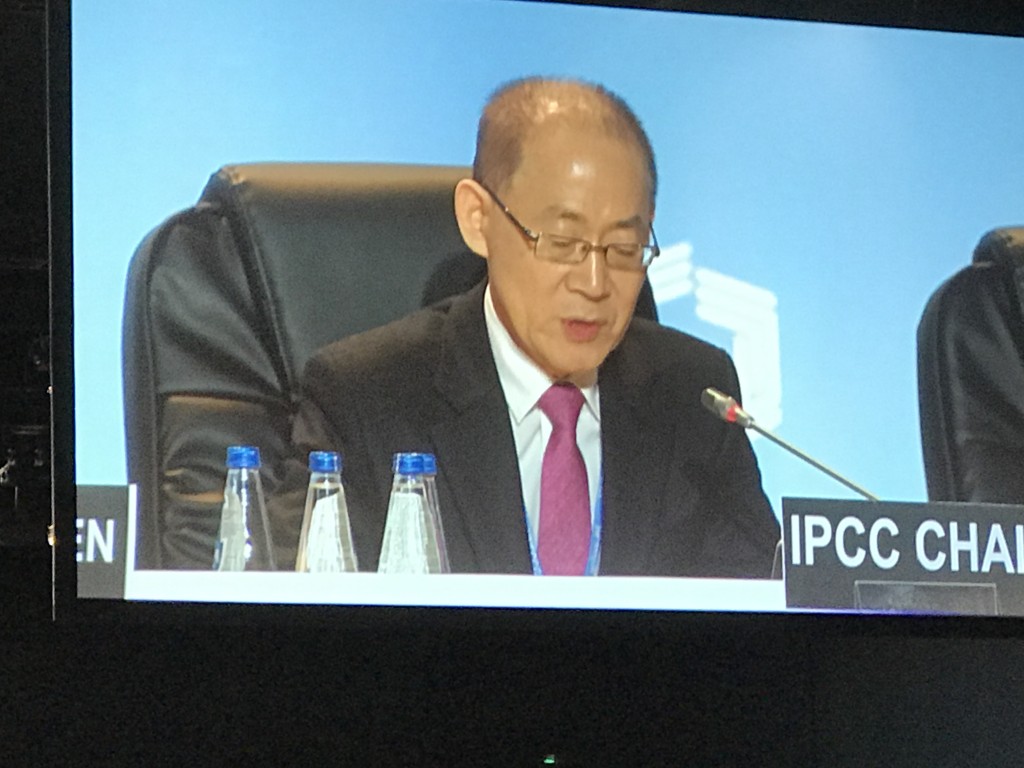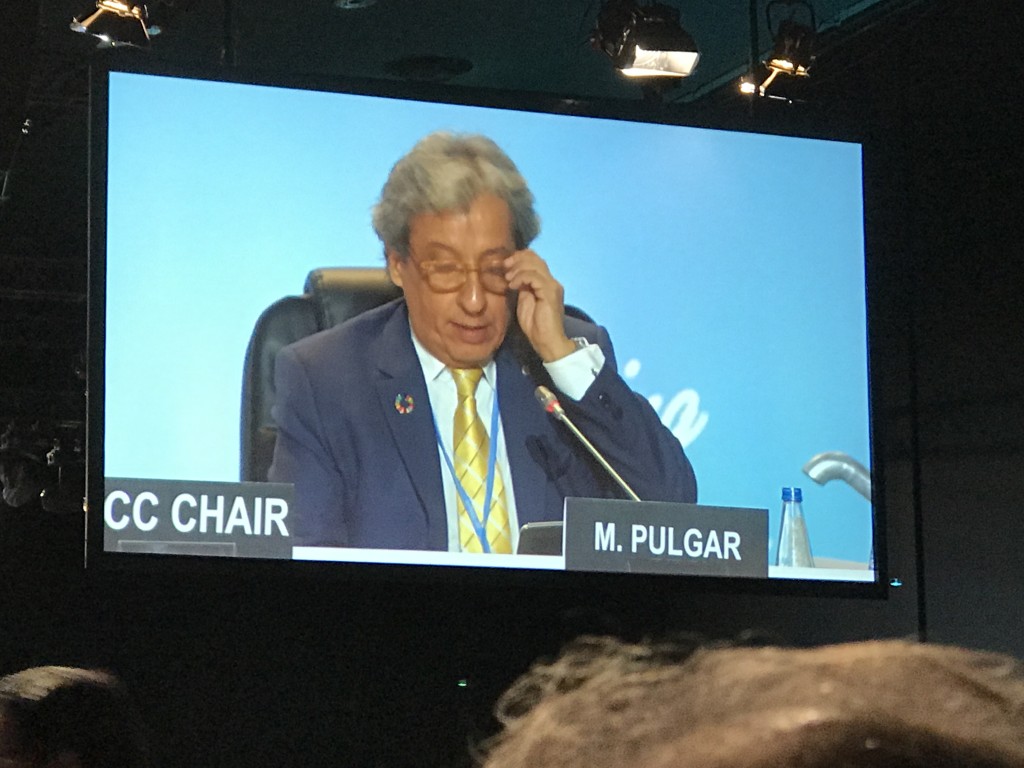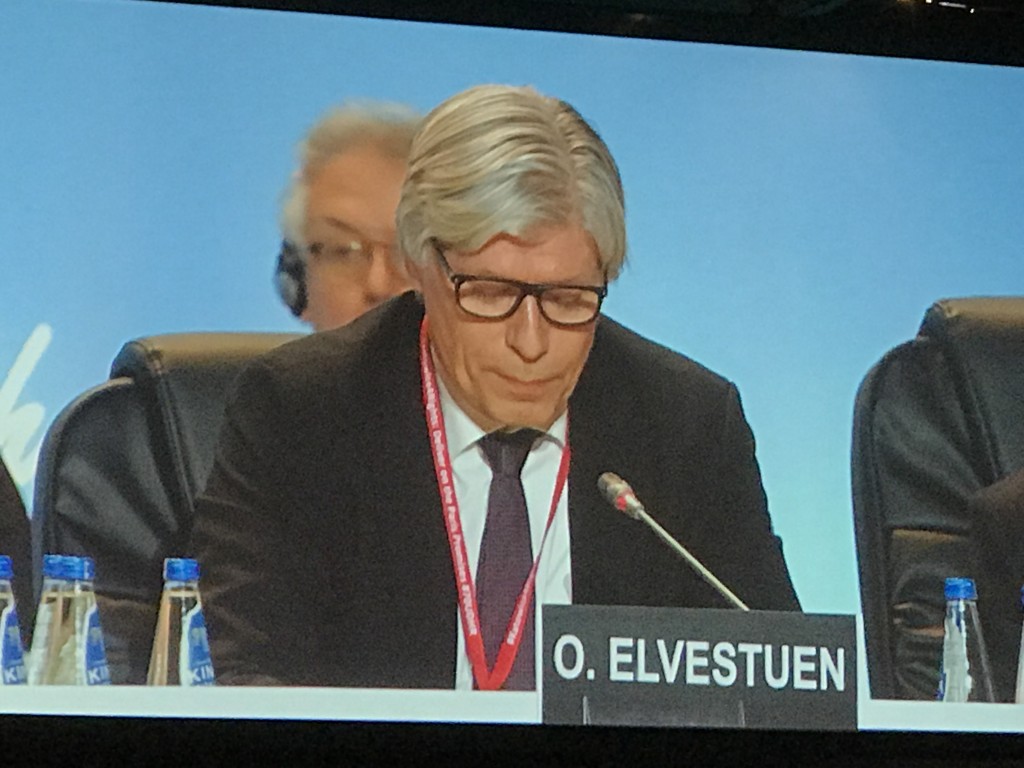The pre-2020 global stocktake was originally the focus of the facilitated dialogue but it seems to have branched off into its own terrain with the introduction of the Talanoa Dialogue. (This separation from the Talanoa Dialogue is perhaps not ideal, but it’s hard to see how the two could have remained more closely intertwined.) This summary began before the ending of the RINGO session, so I came in toward the end of the IPCC chair’s report. He spoke very powerfully, I thought–I was taking notes as fast as I could…
“Even at 1.5C, adaptation capacities will be exceeded in some places. We all know the road we are traveling. Building coal plants now commits governments to decades of fossil fuel consumption. This affects people directly.
“We need to link climate policies with efforts to retrain workers move away from carbon-intensive sectors; we need to take a close look at the economics of climate policy.
“We need to move from fossil fuels to a new resilient economy, based on energy efficiency, healthy diets, and sustainable consumption choices. This will help with stabilization of climate and improve the well-being of all. The scale need not worry us: we know that the last 30 years have also seen unprecedented technological change.
“The combination of technological change and wise policy will be powerful.
“Every bit of warming matters.
“Every year matters.
“Every individual action matters.”
Manuel Pulgar summarized yesterday’s high-level discussions of finance, summarizing the issues emphasized in discussions on Monday. “There needs to be a massive scale-up of finance; there are concerns about access to public and predictable financing; it’s critically important to have clear eligibility criteria for financing.” He did not, as far as my notes stretch, engage the question of funding for adaptation as opposed to mitigation, and this is one major point of dispute here in Katowice.
Minister Elvestuen summarized the ambition stocktake of the first week of COP24, emphasizing both what had been accomplished and the need to do more. On the plus side of the account were numerous examples of technical advice and capacity building, as well as financial support from GEF (the Global Environment Facility) and GCF (the Green Climate Fund). The GEF has funded nearly 1000 projects in 167 countries; the GCF has funded provisional projects in 96 countries. Elvestuen also summarized the session facilitated by Rachel Kyte Monday.
Finally, L(auren?) Fabius raised the rhetorical bar. (I’m sorry not to have a photo of his image on the screen.) Here’s a semblance of his speech:
“The Talanoa Dialogue is about telling stories. My story, based on COP21, tells briefly what could and should be a successful COP24.
“It should include the rulebook of Paris Agreement, with precisely defined transparency and accounting mechanisms. It should confirm 1.5 and 2 degrees Celsius as our goal, a move to zero emissions. A CBDR principle (common but differentiated responsibilities) in relation to financing with at least $100 billion per year for mitigation and adaptation. It should set a more ambitious goal before 2025. A successful COP 24 could and should send a clear message that in Katowice we decide to step up.
“I underline that in my story Katowice must be very ambitious: why? Every report since 15 shows that we need to accelerate Paris. Most recent events and reports show [this]. Many of our NDCs are not sufficient and many are not properly implemented.
“In 2018 carbon emissions are rising by more than 2% when they were supposed to be diminishing. The world—the real world—is not on track. We need to do more and do it faster.
“The IPCC report on 1.5. shows the importance of fighting for every half degree; it shows the disastrous consequences of breaking that boundary.
“The real story is not yet written and can be different. We can still build a sustainable world for current and future generations–provided we achieve a drastic cut–and by drastic, I mean rapid, deep, and just–by everyone in every sector.
“When I was preparing for this talk, I found in my papers a personal letter from former secretary general Kofi Annan, written four days after the Paris Agreement: “COP 21 showed that change is possible if the necessary political will is there. Diplomats, scientist, business people, civil society came together. With political will and unity—all is said. We need a long-term political vision of what is necessary to a just and sustainable world.
“This second week is a political week. The Parties can have a positive role if they decide to act properly–or a negative role if they act not only as somnambulists as Gutierrez rightly called them but also as spoilers.
“In the names of all those who signed it (all of you) and for millions for whom this is their only hope: Live up to the spirit and letter of Paris. Act better, faster, together. We have four days to finish a job. It is short but it is vital.”


